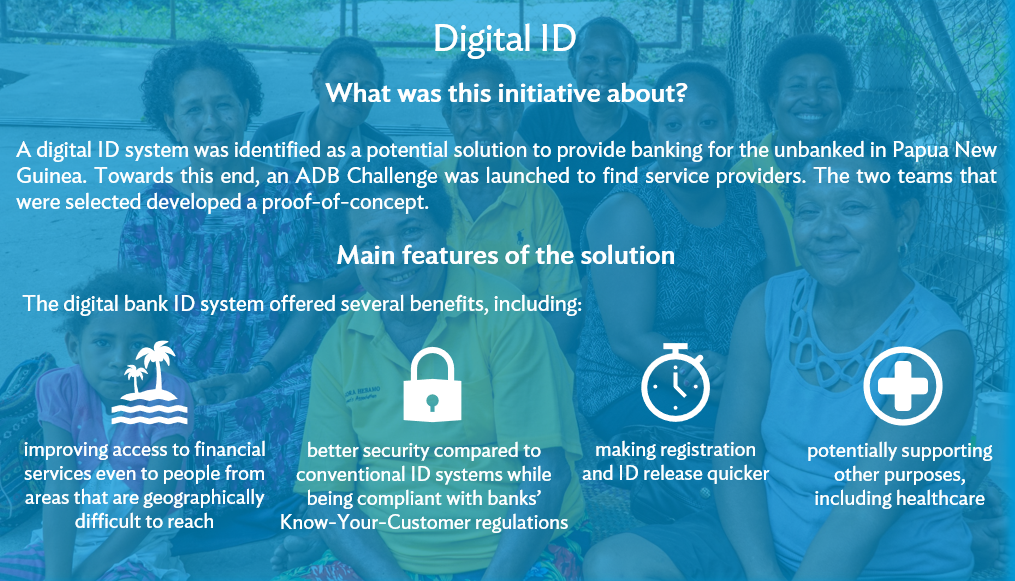Digital ID: Leveraging technology to help the unbanked get access to financial services
Country: Papua New Guinea
Start of implementation: 2018
Technology: Digital bank ID system
ITD Partner ADB Department: Climate Change and Sustainable Development Department, Financial Sector Group
ADB Partners:
· Bank of Papua New Guinea
· eID (Digizen) and Tatak—technology service providers
In line with ADB’s Operational Priority: Addressing remaining poverty and reducing inequalities—Access to opportunities increased for the most vulnerable
Papua New Guinea (PNG) had birth registries that are lower compared to the global average, with an estimated 80% of the population not having a clear form of birth identification. The lack of formal identity documents restricted residents’ access to financial services. Those who did not have official identification cards (IDs) needed to secure three letters from persons of public trust, such as their village chief or a church minister, who could confirm their identity. In addition, they had to travel back and forth to the nearest physical bank branch, which could take several hours or days and incur considerable costs.
The Bank of Papua New Guinea (BPNG), the central bank of PNG, sought assistance from ADB to support it in reaching its goal of providing financial inclusion for all citizens. Improving access to financial services for poverty-affected individuals and households can reduce inequality by 10–20%.
Two ADB missions were subsequently conducted in 2018 to explore whether emerging technologies could be used to improve financial and social inclusion despite limited connectivity and electricity in PNG. In addition, only 75% of the people in PNG had an SMS-capable mobile phone at the time. Among the recommendations that emerged from the missions was to test a digital bank ID system to offer banking for the unbanked in PNG. The digital bank ID system was considered a potential solution given PNG's unique challenges and context. Besides being determined as an option that was easy for citizens to adopt, it also had the potential to be used for other purposes beyond banking. A Know-Your-Customer (KYC) framework that aligned with customer due diligence standards also needed to be implemented in conjunction with the digital ID system.
The digital bank ID system offered several benefits that were responsive to the challenges in PNG. It promoted inclusivity by removing barriers to getting identification. It offered better security compared to conventional ID systems. Steps could also be taken to ensure that the process would be compliant with the KYC regulations of BPNG. Furthermore, digital bank IDs could be produced and released within minutes. Banks could go directly to the communities instead of waiting for the customers to go to them, making registration quicker. Besides financial inclusion, the digital bank IDs could potentially be used for other purposes, including giving holders access to healthcare and health insurance.
In September 2018, ADB launched its first hackathon during the Digital Development Agenda Forum in 2018. This event was deemed as a way to introduce innovation crowdsourcing to ADB. The “Digital ID challenge” was one of the three challenges that were run during the hackathon. eID (Digizen) and Tatak, were selected out of 24 teams in the challenge.
Digizen and Tatak were enjoined to collaborate to integrate their proposed solutions into a single digital ID proof-of-concept as their offered solutions were seen as complementary: Digizen’s eID pitch was strong on offline use cases, while Tatak offered a digital-first and online platform with offline capabilities. Hence, the teams deemed it possible to align and develop a single product integrating these two solutions. With guidance and input from ADB, the two teams had initial online discussions on how to develop a solution that unifies their software solutions. An on-site scoping workshop involving Digizen, Tatak, and ADB was subsequently conducted in December 2018. Key stakeholders from PNG were also consulted.
The output of the workshop was the digital ID concept and plan, which included the KYC process, the timeline for the on-site testing of the digital ID solution in PNG, other potential use cases of the digital ID, and costing. The plan also reflected the proposed high-level architecture, which delineated the roles of Tatak and Digizen.
This initiative paved the way for the digital ID concept to be developed and tested in PNG. In January 2019, representatives from Digizen and Tatak participated in a mission to Papua New Guinea to conduct consultations with the local stakeholders. Digizen subsequently continued to work on the digital ID initiative in collaboration and with the support of BPNG. Discussions were held by Digizen and PNG stakeholders on the other potential use cases of digital IDs, although the minimum viable product still focused on using the card for banking. The test took place in January 2020 and simulated the enrollment of new users in selected PNG villages given the various challenges on the ground, i.e., limited mobile and Internet connectivity and exposure to sun and rain. The solution was pilot-tested from December 2022 to March 2023, with over 2,500 registrations. As of June 2023, the digital bank ID has graduated from the regulatory sandbox to commercial deployment.

